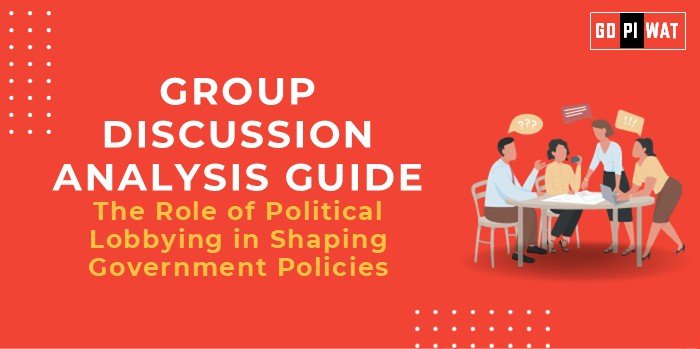📋 Group Discussion Analysis Guide
🌍 Topic: The Role of Political Lobbying in Shaping Government Policies
🌐 Introduction to the Topic
Opening Context: Political lobbying, a powerful tool in shaping government policies, significantly influences public and private sectors. Globally, it drives democratic discourse but raises ethical and regulatory concerns.
Topic Background: Lobbying’s roots trace back to democratic principles, with its role evolving into a strategic mechanism for policy advocacy. In India, lobbying exists informally, with debates about its necessity and transparency intensifying, especially post-India’s corporate reforms era.
📊 Quick Facts and Key Statistics
- 🌐 Global Lobbying Industry Size: $10 billion+ (2023) – Reflects lobbying’s economic and political influence.
- 📉 Transparency Index (India): Ranked 85/180 in the Corruption Perception Index – Highlights governance transparency issues.
- 💰 Top Lobbying Spend: U.S. healthcare sector, $700M (2022) – Demonstrates sectoral lobbying influence globally.
- 📈 India’s Corporate Advocacy Growth: 15% annually – Shows increasing private-sector engagement in policy advocacy.
🧩 Stakeholders and Their Roles
- 👩⚖️ Government Bodies: Draft, negotiate, and implement influenced policies.
- 🏢 Corporates: Advocate for industry-specific reforms or favorable regulations.
- 👥 Citizens and NGOs: Push for social welfare and ethical transparency.
- 📰 Media: Expose unethical lobbying or influence public opinion.
🏆 Achievements and Challenges
✨ Achievements:
- Policy Innovations: Energy reforms influenced by corporate advocacy in renewable energy.
- Economic Growth: Industry-specific lobbying led to favorable GST slabs for MSMEs.
- Governance Improvements: Advocacy for Digital India improved transparency in citizen services.
⚠️ Challenges:
- Lack of Regulation: No formal lobbying laws in India lead to ethical concerns.
- Disproportionate Influence: Corporate bias over public interest.
- Transparency Deficit: Limited accountability in lobbying-related policy shifts.
🌍 Global Comparisons
- U.S.: Mandatory disclosure of lobbying expenses fosters transparency.
- EU: Regulated by a mandatory Transparency Register.
📚 Case Studies:
- India: Opposition to FDI in retail by local trader groups successfully delayed legislation.
- Global: U.S. healthcare reforms shaped by sectoral lobbying efforts.
🛠️ Structured Arguments for Discussion
- Supporting Stance: “Lobbying fosters democratic representation by allowing diverse voices to influence policies.”
- Opposing Stance: “Unregulated lobbying undermines democracy by prioritizing corporate agendas over public welfare.”
- Balanced Perspective: “While lobbying can enhance policy inclusivity, robust regulation is essential to prevent ethical violations.”
💡 Effective Discussion Approaches
- Opening Approaches:
- “India’s lack of formal lobbying laws raises critical questions about transparency in policymaking.”
- “Lobbying, a $10B industry globally, drives economic and social discourse yet remains controversial.”
- Counter-Argument Handling:
- Acknowledge disproportionate influence concerns.
- Present solutions like mandatory disclosures or lobbying regulations.
📈 Strategic Analysis (SWOT)
- Strengths: Democratic representation, economic impact, sectoral reforms.
- Weaknesses: Transparency issues, disproportionate influence.
- Opportunities: Regulatory frameworks, inclusive lobbying.
- Threats: Ethical controversies, public distrust.
🎓 Connecting with B-School Applications
- Real-World Applications: Explore lobbying’s impact on financial policy reforms and CSR strategies.
- Sample Interview Questions:
- “How can India regulate lobbying to balance transparency and influence?”
- “Discuss lobbying’s role in global trade policies.”
- Insights for Students:
- Use lobbying insights for governance and CSR-focused internships.
- Explore case studies to understand advocacy’s economic impact.


